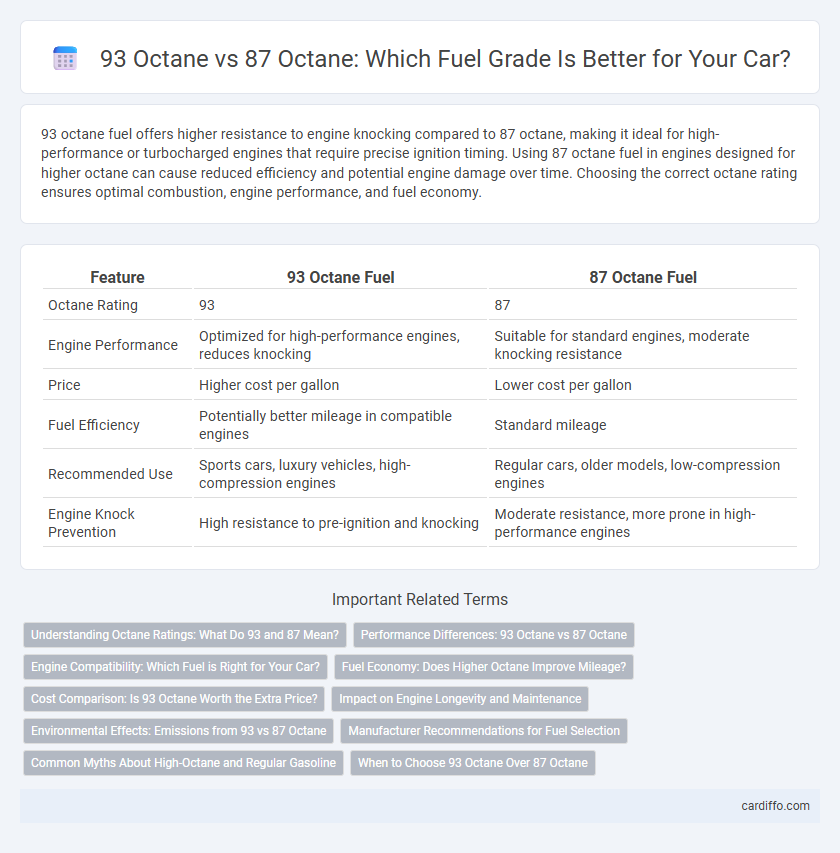93 octane fuel offers higher resistance to engine knocking compared to 87 octane, making it ideal for high-performance or turbocharged engines that require precise ignition timing. Using 87 octane fuel in engines designed for higher octane can cause reduced efficiency and potential engine damage over time. Choosing the correct octane rating ensures optimal combustion, engine performance, and fuel economy.
Table of Comparison
| Feature | 93 Octane Fuel | 87 Octane Fuel |
|---|---|---|
| Octane Rating | 93 | 87 |
| Engine Performance | Optimized for high-performance engines, reduces knocking | Suitable for standard engines, moderate knocking resistance |
| Price | Higher cost per gallon | Lower cost per gallon |
| Fuel Efficiency | Potentially better mileage in compatible engines | Standard mileage |
| Recommended Use | Sports cars, luxury vehicles, high-compression engines | Regular cars, older models, low-compression engines |
| Engine Knock Prevention | High resistance to pre-ignition and knocking | Moderate resistance, more prone in high-performance engines |
Understanding Octane Ratings: What Do 93 and 87 Mean?
Octane ratings measure a fuel's ability to resist knocking during combustion, where 93 octane represents a higher resistance compared to 87 octane, making it suitable for high-performance or turbocharged engines. The number indicates the fuel's efficiency in preventing engine knock, ensuring smoother and more efficient performance. Using the appropriate octane rating recommended by the vehicle manufacturer optimizes engine power and longevity while preventing potential damage from premature combustion.
Performance Differences: 93 Octane vs 87 Octane
93 octane fuel provides higher resistance to engine knocking compared to 87 octane, allowing engines with higher compression ratios to perform optimally. Vehicles designed for 93 octane benefit from improved acceleration, smoother power delivery, and better fuel efficiency due to more efficient combustion. Using 87 octane in engines requiring higher octane fuel can lead to reduced performance, increased emissions, and potential long-term engine damage.
Engine Compatibility: Which Fuel is Right for Your Car?
Vehicles designed with higher compression engines typically require 93 octane fuel to prevent knocking and ensure optimal performance, while most standard engines run efficiently on 87 octane fuel. Using 93 octane in cars that don't require it generally provides no significant benefit and may result in unnecessary expense. To determine the correct fuel, always consult the vehicle's owner manual or manufacturer recommendations regarding engine compatibility with specific octane levels.
Fuel Economy: Does Higher Octane Improve Mileage?
Fuel economy differences between 93 octane and 87 octane gasoline are generally minimal for most vehicles designed to run on regular fuel. Higher octane fuel has increased resistance to engine knocking, benefiting high-performance or turbocharged engines that require it to operate efficiently and avoid damage. Using 93 octane in engines not requiring it rarely improves mileage and can lead to unnecessary extra cost without fuel economy gains.
Cost Comparison: Is 93 Octane Worth the Extra Price?
93 octane fuel typically costs 20-40% more per gallon than 87 octane, affecting overall fuel expenses significantly. Vehicles designed for regular fuel perform efficiently on 87 octane, making the higher price of 93 octane often unnecessary. High-performance engines requiring 93 octane can benefit from improved combustion and engine longevity, potentially justifying the added cost.
Impact on Engine Longevity and Maintenance
Using 93 octane fuel instead of 87 octane can significantly reduce engine knocking, leading to smoother combustion and less stress on engine components, which enhances engine longevity. High-octane fuel resists pre-ignition better, lowering the risk of damage to pistons, valves, and gaskets, thereby decreasing the frequency and cost of maintenance. Vehicles engineered for premium fuel benefit from improved performance and durability, while using lower octane than recommended may cause increased wear, overheating, and costly repairs over time.
Environmental Effects: Emissions from 93 vs 87 Octane
Higher octane fuel, such as 93 octane, generally produces cleaner combustion with fewer unburned hydrocarbons and lower carbon monoxide emissions compared to 87 octane. This improved combustion efficiency can reduce the release of harmful pollutants that contribute to smog and air quality degradation. However, the environmental benefits may vary depending on the vehicle's engine design and its ability to optimize higher octane fuel performance.
Manufacturer Recommendations for Fuel Selection
Manufacturers recommend using 93 octane fuel for high-performance or turbocharged engines to prevent knocking and optimize power output, while 87 octane is suitable for most standard engines designed for regular driving conditions. Selecting the correct octane level per the vehicle's owner's manual ensures efficient combustion, engine longevity, and optimal fuel economy. Ignoring these recommendations can lead to engine knocking, reduced performance, and potential long-term damage.
Common Myths About High-Octane and Regular Gasoline
High-octane fuel, like 93 octane, is often mistakenly believed to provide better fuel economy and more power in all vehicles, but it primarily benefits high-performance or turbocharged engines designed for higher compression. Regular gasoline with 87 octane is sufficient for most standard engines and prevents engine knock when used as recommended by manufacturers. Misconceptions about octane ratings overlook that higher octane does not inherently mean cleaner or more efficient combustion in engines not designed for it.
When to Choose 93 Octane Over 87 Octane
Choose 93 octane fuel over 87 octane when driving high-performance or luxury vehicles with engines specifically designed for higher compression ratios, as 93 octane resists knocking and improves combustion efficiency. Use 93 octane in turbocharged or supercharged engines to maximize power output and protect engine components from premature wear. For everyday vehicles with standard engine designs, 87 octane is generally sufficient, making 93 octane necessary only when manufacturer specifications or performance needs dictate.
93 Octane vs 87 Octane Infographic

 cardiffo.com
cardiffo.com